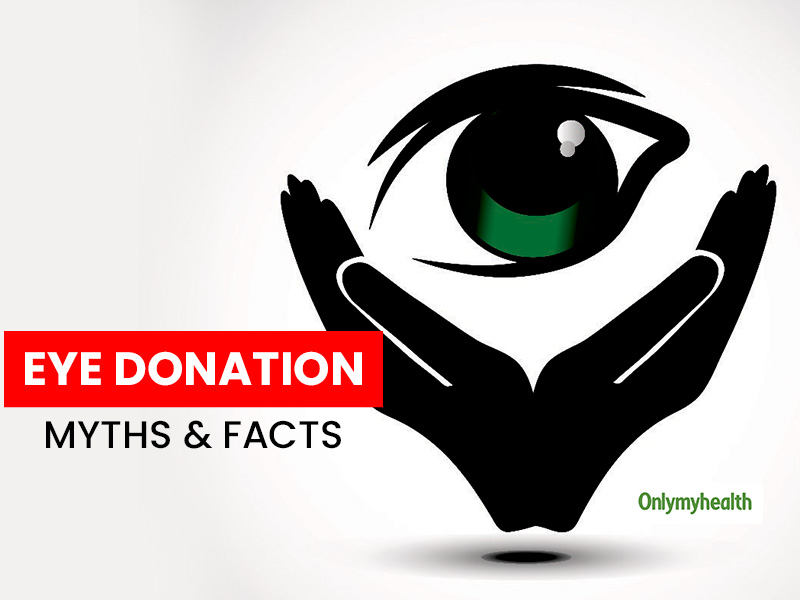
According to reports, there are an estimated 15 million people in India who are blind & 30 million who are visually challenged. With an ever-increasing demand for corneal transplant surgeries every year, there is a severe need for eye donations that will meet this requirement. In India, so far, promoting and spreading awareness about eye donation is seldom the onus of the community, due to multiple myths surrounding the cause; it then becomes the duty of doctors, caregivers and hospitals to build much-needed awareness. Medical communities have been steadfastly steering this initiative to spread awareness that will translate into donations that could enrich thousands of lives.
Table of Content:-
MYTH 2: Vision in one's next birth would be disabled is eyes are donated
MYTH 4: Every blind person ca be helped through eye donation
MYTH 5: If you suffer from a retinal issue or have had a surgery in eye, ypu cannot be an eye donor
Myth 6: Eye donation can be done anytime after death and by any cause of death
Myth 7: If my eyes are donated, they ate sold to a person waiting for a transplant

WHAT IS AN EYE TRANSPLANT?
The front of the eye is covered by a transparent tissue called the cornea. If the cornea develops a cloudy form, either due to an injury, disease or even malnutrition, a person experiences impaired vision or sometimes complete loss of vision. This condition of corneal blindness can be fixed by replacing the damaged cornea with a healthy human cornea, procured through the donation of eyes.
It is an honourable gesture to gift someone sight; however, at times, myths and misconceptions prevent one from doing so. Here are a few myths that need to be dispelled on eye donation; understanding the fact behind these myths is what will help us take a progressive step in the direction of pledging and donating eyes.
MYTH 1. Eye donation can cause disfigurement of the face
Fact: Eye donation does not cause disfiguration to the face. During this procedure, the Corneas are removed and replaced with a shell, when the eyes are closed, it appears normal.

Also Read: Not Just Your Skin, But Your Eyes Can Get Sunburnt Too. Here's All You Need To Know
MYTH 2: Vision in one's next birth would be disabled is eyes are donated
Fact: Nobody is sure of the next birth, and if there is one, then it comes with a new body and does not need the eyes of the previous birth. This is an absolute myth, and one of the biggest reasons for the drop in eye donation numbers.
MYTH 3: Eye donation can be accomplished even while alive
Fact: While the Kidneys or a part of the Liver may be donated from a live person to another, eye donation is made only after death. You may pledge to donate your eyes while alive, and encourage your family in partnering you for this cause.
MYTH 4: Every blind person ca be helped through eye donation
Fact: Only individuals with the opacity of the Corneas (the front transparent portion of the eye) can benefit. In contrast, others with Retina or Optic Nerve related blindness do not benefit from eye donation.

MYTH 5: If you suffer from a retinal issue or have had a surgery in eye, ypu cannot be an eye donor
Fact: Every person, whether young or old, any blood group or whether having undergone surgery or with retinal or optic nerve issues can donate their eyes.
Myth 6: Eye donation can be done anytime after death and by any cause of death
Fact: Eye collection from a donor needs to be done within 6 hours after death to be of use to a recipient. The body of the donor needs to be placed in a cold environment, with fans switched off, eyes closed, moist cotton placed on the eyes and two pillows under the head. The local eye collection centre (hospital) or the eye bank needs time to be contacted. Also, if the cause of death is septicemia, HIV, rabies etc. the eyes would be used for research and development rather than for donating to a blind recipient.
Myth 7: If my eyes are donated, they ate sold to a person waiting for a transplant
Fact: Selling and buying of any human organ are illegal and is a punishable offence as per law; it is a noble cause and is regulated by authorized bodies.

Eye donation is a noble act that can be undertaken by anyone. Without one’s eyes, life may seem to be incomplete; a donation after death may be their most significant gift, one that brings light to their lives. Hence it is essential to spread awareness and promote the cause of eye donation. Each of us can decide to take this progressive step, in a bit to enrich another human life.
With inputs from Dr Harshwardhan Ghorpade, Cornea, Cataract & Refractive Surgeon, Hiranandani Hospital, Vashi-A Fortis Network Hospital
Read more articles on Other Diseases
How we keep this article up to date:
We work with experts and keep a close eye on the latest in health and wellness. Whenever there is a new research or helpful information, we update our articles with accurate and useful advice.
Current Version